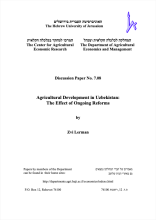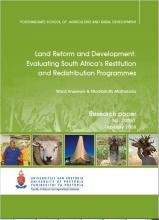/ library resources
Showing items 1 through 9 of 51.Since the collapse of the Soviet Union and agricultural decollectivisation, post-socialist rural contexts have afforded commons scholars particularly fertile ground for examination of institutional change and evolution under new modes of governance.
Countries retain powers of compulsory acquisition in order to enable governments to acquire land for specific purposes.
The articles in this volume supplement FAO Land Tenure Studies 10, Compulsory acquisition of land and compensation. The latter publication explains what compulsory acquisition and compensation are and what constitutes good practice in this area.
The central themes of this book are customary law, traditional leadership and local land management.
Agricultural transition in Uzbekistan, as in all CIS countries, is driven by a process of land reform, which involves redistribution of land among producers and concomitant changes in farm structure.
The institutional change in rural Kyrgyzstan during the transition period included farm reorganization, land reform, building markets, and community institutions.
Vietnamese land-tenure policy reforms were embedded into general economic reforms (Doi Moi), enabling the country’s transition toward a market economy.
At the first conference on land redistribution in South Africa, held in Johannesburg in 1993, Cyril Ramaphosa, the then secretary general of the ANC, noted that South Africa is not unique in its unequal land distribution but rather in the policy measures that have led to this situation (ANC, 1993
Paginação
Land Library Search
Through our robust search engine, you can search for any item of the over 73,000 highly curated resources in the Land Library.
If you would like to find an overview of what is possible, feel free to peruse the Search Guide.





